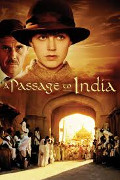
Directed by
David Lean
163 minutes
Rated M
Reviewed by
Bernard Hemingway

Passage To India, A
After the critical and commercial failure of Ryan’s Daughter (1970) David Lean effectively retired from film-making only to re-emerge fourteen years later with his adaptation (he wrote and edited the film as well as directed it) of E.M.Forster’s classic 1924 novel about a young woman, Miss Adela Quested (Judy Davis), who arrives in Chandrapore, India shortly after WWI as the Indian independence movement is building to a critical mass. She is in the company of elderly Mrs. Moore (Peggy Ashcroft) whose son Ronny Heaslop (Nigel Haver), the city magistrate, Adela is considering marrying. The British occupiers, including Ronny, maintain a strict apartheid. When the two women cross that line and befriend an Indian doctor, Aziz H. Ahmed (Victor Banerjee) they upset the order of things.
Although the film does not have the scale of Lean’s globe-trotting epics such as Doctor Zhivago (1965) and The Bridge On the River Kwai (1957) not to mention Lawrence Of Arabia (1962) this is not necessarily a bad thing and A Passage To India is at its best in depicting the exoticism of India, both in terms of its physical splendours and its chaotic social system and making this integral to his story of colonial arrogance, moral revulsion and sexual repression.
Lean’s handling of the story, although solid is however not entirely satisfying. Apparently the film had a troubled production with Lean alienating all concerned in front of and behind the camera including Davis who was making her first international screen appearance of note. The actress, as we know, can do high-strung as few others can but Davis’s Adela lacks the neurasthenic sensibility necessary to make the narrative’s key event and what comes thereafter work. Whether Lean kept too tight a rein on her is impossible to tell but in the case of Haver we have an unduly bland performer his character seeming barely interested in his possible future spouse and in Banerjee, although with a winning eagerness, a tendency to over-act. To some extent these shortcomings are counter-balanced by fine performances from Ashcroft (who won a Best Supporting Actress Oscar) and James Fox in an unusually sympathetic role as a liberal-minded school-principal. (Davis was nominated for an Oscar but lost to Sally Field for Places In The Heart. An unrecognisable Alec Guinness is also very effective as a Brahmin scholar, Professor Godbole (apparently Lean regular Guinness who had starred and won an Oscar for River Kwai fell out with the directorand most of his scenes were left on the cutting room floor with the two men never speaking to each other again).
Maurice Jarre’s lush score was a reworking of his contribution to Ryan’s Daughter.
FYI: The film was not a box office success and Lean went back into retirement, dying in 1991 aged eight-three..
Want something different?





